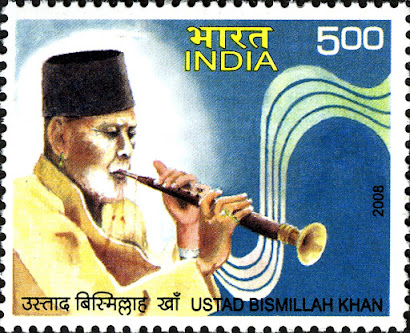Introduction:
The lesson is about
the famous shehnai player Ustaad Bismillah Khan. He has taken shehnai playing
to the classical stage and introduced it to the world. He played the shehnai on the
day India got independence i.e. 15th August 1947 at the Red Fort. Though he was
a devout Muslim, he played shehnai in the Kasi Viswanath temple.
Meanings:
banned: prohibited
shrill: very sharp
unpleasant: something
that we do not like
generic name: a name given to a class or group as a whole / Generic
name means the scientific name or a broad classification of something
reeded: wind instruments which have reeds like the flute,
the clarinet, etc.
revived: brought back to life.
tonal quality: a quality related to sound
hollow: empty from inside.
auspicious: promising to bring good fortune,
indispensable: without which a piece of work cannot be done,
something which is necessary
ensemble: things
(here, instruments) considered as a group
paternal ancestors: ancestors of the father
captivated: attracted
on end: for a very long time without stopping, continuously
apprentice: trainee
haunt: a place frequented by a specified person /place you
like come, where you like to visit many times a day
solitude: being alone, single
recital: performance
taken in by: attracted or charmed by
souvenirs: things
given in memory of a place, person or event
chartbuster: record-breaker
celluloid: an old fashioned way of referring to films
venture: a project that often involves risk, something which
has a lot of risks
emphasis: to lay stress on something
thick and fast: he got a lot of awards and was recognized at
many places conferred: given, usually, an award or a degree coveted: much
desired
replicating: making a copy of something
yearning: longing, having a desire for something
devout: believing strongly in religion and obeying its
laws and following its practices
Summary:
Bismillah Khan made a great contribution to the world of
music through ‘shehnai’. He was honored with India’s highest civilian honor -
the Bharat Ratna in 2001. He was from a family of musicians. He improvised many
new ragas with the shehnai and thus placed it among other classical musical
instruments. He won accolades internationally.
The Mughal Emperor Aurangzeb banned the playing of the pungi
in his royal court. He disliked its unpleasant sound. A barber tried to improve
the pungi’s tone by using a hollow stem, wider and longer than the pungi and made
seven holes on it. He blew into it closing and opening the holes. The
improvised instrument produced soft, melodious music. As this was done by a
barber, ‘nai’ in Hindi and was played in the court of the king, ‘shah’, the
instrument was named ‘shehnai’. Playing the shehnai became a part of
auspicious occasions. It was also a part of the group of nine musical
instruments that were played at the royal court.
Bismillah Khan was born at Dumraon, Bihar in 1916 in a
family of musicians. His grandfather Rasool Bux Khan, his father, Paigambar Bux, and his paternal, and maternal uncles, were shehnai players. In his
childhood, Bismillah Khan used to visit Bihariji temple and sing the Bhojpuri
Chaita. During his childhood, he was attracted by shehnai and started learning to play it. He used to practice at the
temple of Balaji and Mangala Maiya, by the banks of the holy river Ganga. Bismillah
Khan invented ragas that were thought to be beyond the range of the shehnai.
When he was fourteen, he performed at the Allahabad Music Conference
and his talent was appreciated by Ustaad Faiyaz Khan. In 1938, when the All
India Radio was started in Lucknow, he became a regular shehnai player there. On
15th August 1947, Bismillah Khan performed from the Red Fort and greeted the
country through his shehnai. He recited Raag Kafi which was followed by Pandit
Jawaharlal Nehru’s famous ‘Tryst with Destiny’ speech.
Bismillah Khan performed all around the world taking shehnai
playing to the world stage. He also composed music for two films – Hindi film
titled – ‘Goonj Uthi Shehnai’ directed by Vijay Bhatt and Kannada film titled –
‘Sanadhi Apanna’ by Vikram Srinivas.
He was the first Indian to perform at the Lincoln Centre
Hall in the United States of America. He also performed at Montreal, Cannes and
Tokyo. In Teheran, an auditorium was named after him – Tahar Mosiquee Ustaad
Bismillah Khan.
Ustaad Bismillah Khan said that music was India’s richest
heritage and had to be taught to children. Although he had traveled all
over the world, he was attached to Dumraon and Benaras. Once one of his
students asked him to set up a shehnai school in the USA. He even promised to
recreate the temples of Benaras there. Bismillah Khan asked him whether he
would transport the river Ganga also, as he was attached to it as well. Such
was his love for his native land.

good sir keep it up please see my sainosoftex.blogspot.com
ReplyDelete